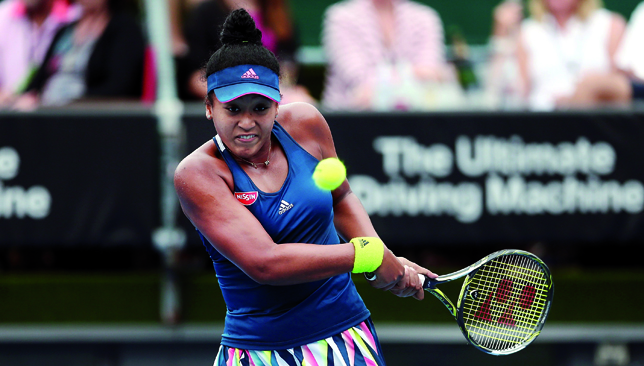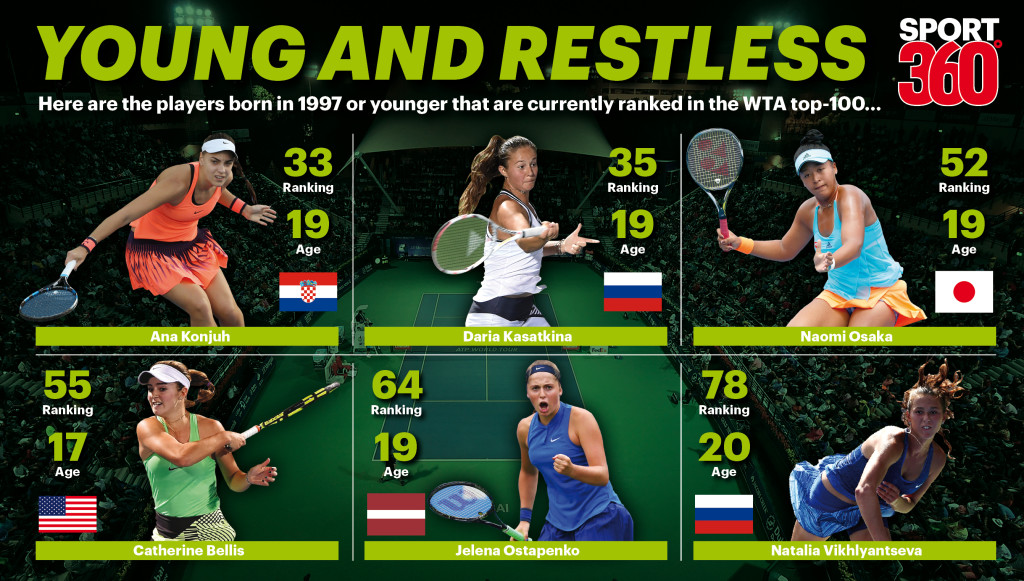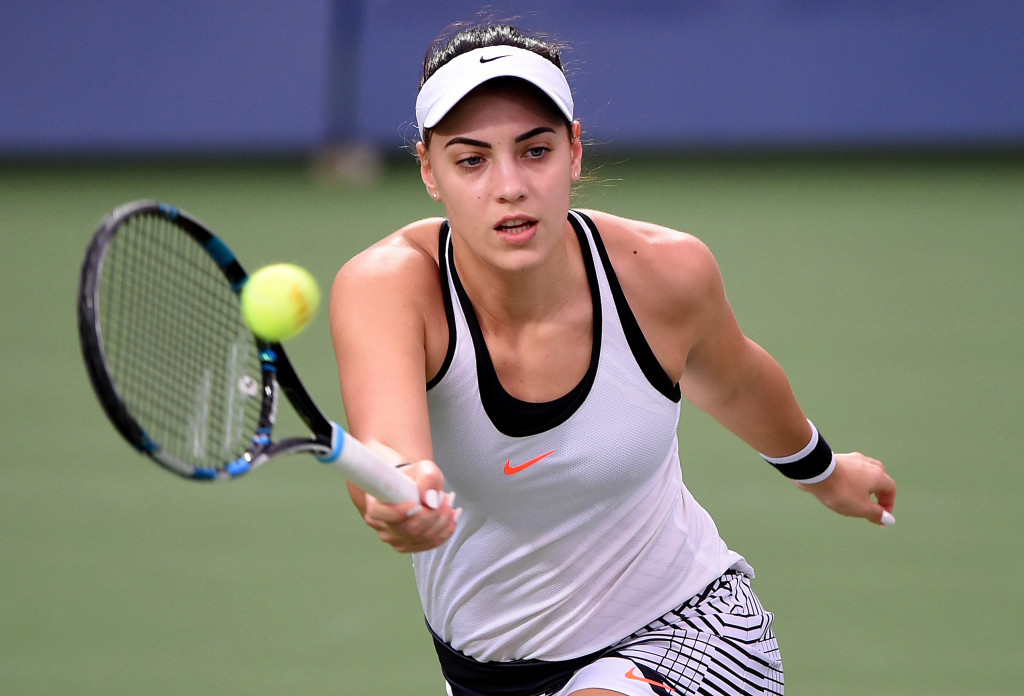
As the tennis tour moves from one desert to another with action kicking off tomorrow at Indian Wells following a two-week stop in the Middle East, a group of young players are hoping to make a statement at one of the biggest tournaments on the circuit.
Of the six top-100 players born in 1997 or later, four of them will be making their Indian Wells main draw debut this week by virtue of their ranking: Ana Konjuh (No33), Naomi Osaka (No52), Catherine “Cici” Bellis (No55) and Jelena Ostapenko (No64).
The remaining two are Russian pair Daria Kasatkina (No35), who made a stunning run to the quarter-finals in the California desert last year on her first appearance, and Natalia Vikhlyantseva (No78), who is currently contesting the qualifying rounds.
Barring Vikhlyantseva, who fell in qualies, members of the young crew all featured in the main draw in Dubai for the first time last month and are still getting used to showing up at the tour’s top-tier events.
Each one of them is unique and they’ve progressed at different paces, but they share common features: They’re all ambitious and they all get along.
Osaka, a 19-year-old Japanese-Haitian who is based in Florida, is perhaps the most compelling of the bunch. She reached the third round in her first three grand slam main draw outings and made her first final appearance in Tokyo last fall, beating the likes of Dominika Cibulkova en route.
She boasts a powerful, brave game that is a stark contrast to her quirky, shy, soft-spoken persona off the court.
Just a public disclaimer I wanna tell you guys...Well, I'm weird. I know it, my family knows it, and my 2 friends know it. #okpeaceout 😫✌️
— NaomiOsaka大坂なおみ (@Naomi_Osaka_) February 13, 2017
Former world No2 Agnieszka Radwanska described Osaka as having “adult tennis” but the teenager laughs when the Pole’s comments are relayed to her.
“That surprises me. I think she thinks I’m like a brainless ball-basher,” Osaka told Sport360 with a self-deprecating chuckle on the sidelines of the Dubai tournament two weeks ago.
“I feel that I’m working on a few things and I need time to adjust to how that is. I feel I have to mature a little bit more and everything is a little bit of a new experience still. This is the first time I’ve played this tournament, I’m actually happy I won a round,” she said following her second round exit in the Emirates.
“I’m the type of player that has to keep doing certain things no matter if I’m losing or not, just to practice it. I’m supposed to be looking to win the tournament not win the match. So like the bigger picture other than just winning this match, I have to think about how I’m going to play in the future. I want to develop into a player that is like an all-rounder that is very aggressive.”
Osaka isn’t just making adjustments to her game to compete at a higher level, she’s also been working on her anxiety, which she says she’s been doing a much better job at dealing with it this year compared to the past.
She’s also been trying to make friends. Osaka has been daring herself to get in touch with fellow players on social media, as a start, and now actually says hello to a few peers, like Konjuh, a Croatian big-hitter who is far more outgoing.
@anakonjuh lol hey! Totally weird random question but, how do you have such perfect eyebrows 😂?
— NaomiOsaka大坂なおみ (@Naomi_Osaka_) January 8, 2017
“I think all the other girls my age, they’re probably all friends because they played the juniors together and I didn’t. So I’m kind of like a strange person on the side trying to get in,” explains Osaka. “But for me personally I think it’s a bit sad if you don’t have any friends here because you see everyone all year round, so to isolate yourself from everyone – that would be lonely I think.”
She apologises when I tell her I follow her on Snapchat – not realising how compelling she is on the social media network – and jokes that Konjuh might find it “creepy” that Osaka considers her a friend.
“I say hi to people. But it’s very hard for me. I have more friends now, like people I can have conversations with, but I think I have to see them more, because I’m still new a little bit, so I think when they get used to me, being really weird, then maybe they’ll talk to me more,” she adds.
Osaka, the 2016 WTA Newcomer of the Year, signed a worldwide marketing and management agreement with IMG last fall. She says joining the sports management giants has been an illuminating experience.
“It’s really kind of fascinating a little bit but it also makes me want to push myself more to do better so that I feel like their choice was justified,” she admits. “I think I did really well in Tokyo and that was kind of like the first (tournament after which I signed with them) and then it’s been like a roller coaster. I think I’m going to do well this year I just have to get over some bumps.”
In what way does she find it fascinating?
“A lot of new things that I’ve seen the good players do and I don’t really consider myself like a good player, like Agnieszka Radwanska and Belinda Bencic. I’m like ‘oh, they want me to do this? Why? People don’t really care about me’. It’s really new everything,” she says sheepishly.

SEARCHING FOR PATIENCE
Konjuh, a former junior world No1 who won both the Australian and US Open girls’ singles titles in 2013, is the highest-ranked of the group and enjoyed a run to the quarters in Dubai before she fell to Angelique Kerber.
She posted her biggest result to date at the US Open last year when she reached the quarter-finals, beating Radwanska along the way.
The 19-year-old from Dubrovnik feels having several teens like herself, rising through the ranks, has been a big help, although she admits life on the pro circuit can often get in the way of childhood friendships.
“In juniors it was a bit different because we all hung out, it wasn’t that professional,” said Konjuh.
“At this level now, you have your team, it’s a pretty big team, you have three, four people with you, so you don’t really have time to relax and just hang out. But I have a few friends from juniors, (ex-world No7) Belinda Bencic, Jelena Ostapenko, Daria Kasatkina, we grew up together so it’s pretty awesome to have them here. I think we motivate each other to be better, so we’re happy to have each other.”

Ana Konjuh in Dubai.
Konjuh considers “being stubborn” her greatest asset and you can tell just from watching her matches. She is the third child amongst four daughters and says she grew up in a female-dominant environment which she believes may have attributed to her strong personality.
She just started working with a new coach, Zeljko Krajan, who is Croatia’s Davis Cup captain, and hopes he can help her add patience to her game.
“I’m still young so practice is still an important thing for me. So I try not to play as many tournaments and have a few weeks of training in between,” she says. “I’m an aggressive player so I try to make points a bit faster than I should so I need to become more patient to be on the court longer, even if I don’t want to.”
Konjuh is still in the phase where she’s enjoying the new stops on tour where she hadn’t visited before and there are tournaments she’d love to cross off her list like Acapulco and Istanbul, although her father won’t let her go to the latter right now for safety reasons.
While the younger players are trying to make waves on tour, the fact remains that the world No1 is the 35-year-old Serena Williams, who recently beat her older sister Venus, 36, in the Australian Open final.
“It makes you think you have 15 more years to play tennis,” said Konjuh, referring to that vintage Melbourne final.
“I say to myself to stop maybe earlier because I would like to have a family and a life after tennis so I really hope I can make my dreams come true before I turn 28 or 29 so I can live the rest of my life enjoying what I did before.
“But they’re 35, 36, it makes you think, it’s a slam final, not a smaller tournament, and I think they motivate you to work harder and that at whatever age you are, everything is possible.”
.@Ons_Jabeur supports @realmadrid. @DKasatkina supports @FC_Barcalona.
— WTA Insider (@WTA_insider) February 19, 2017
So how do these two friends get along? https://t.co/rdzWyLO8YG
Halfway through the conversation, Konjuh is interrupted by both Kasatkina, and 22-year-old Tunisian Ons Jabeur, who cracked a few jokes with the Croatian before moving on.
“It’s very nice that we’re like together, not fighting, or something like this,” says Kasatkina. “It’s good because we’re the next generation, we have to be like the example for the kids, for the future champions, so it’s good.”
Jabeur believes people have the wrong impression about the women’s locker room and that it’s not the frosty, cut-throat environment you’d expect it to be. The younger generation seem keen to keep things friendly, at least for now.
“They have the wrong idea about women in the locker room. That we fight or we have knives or something. No we’re cool. I’m friends with everyone. We’re cooler than men, I tell you,” says Jabeur with a laugh.